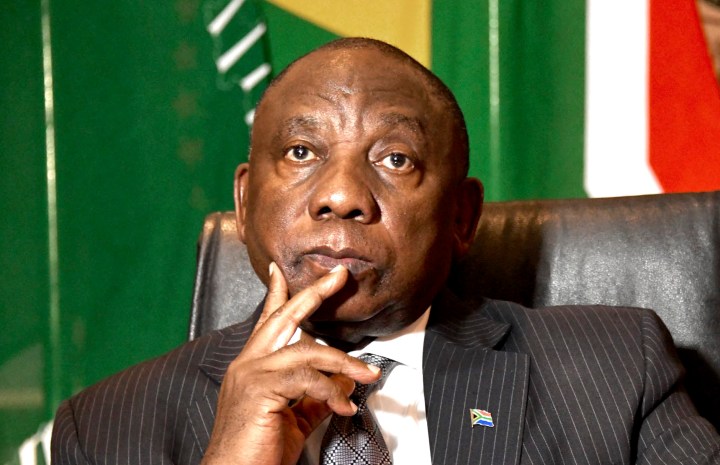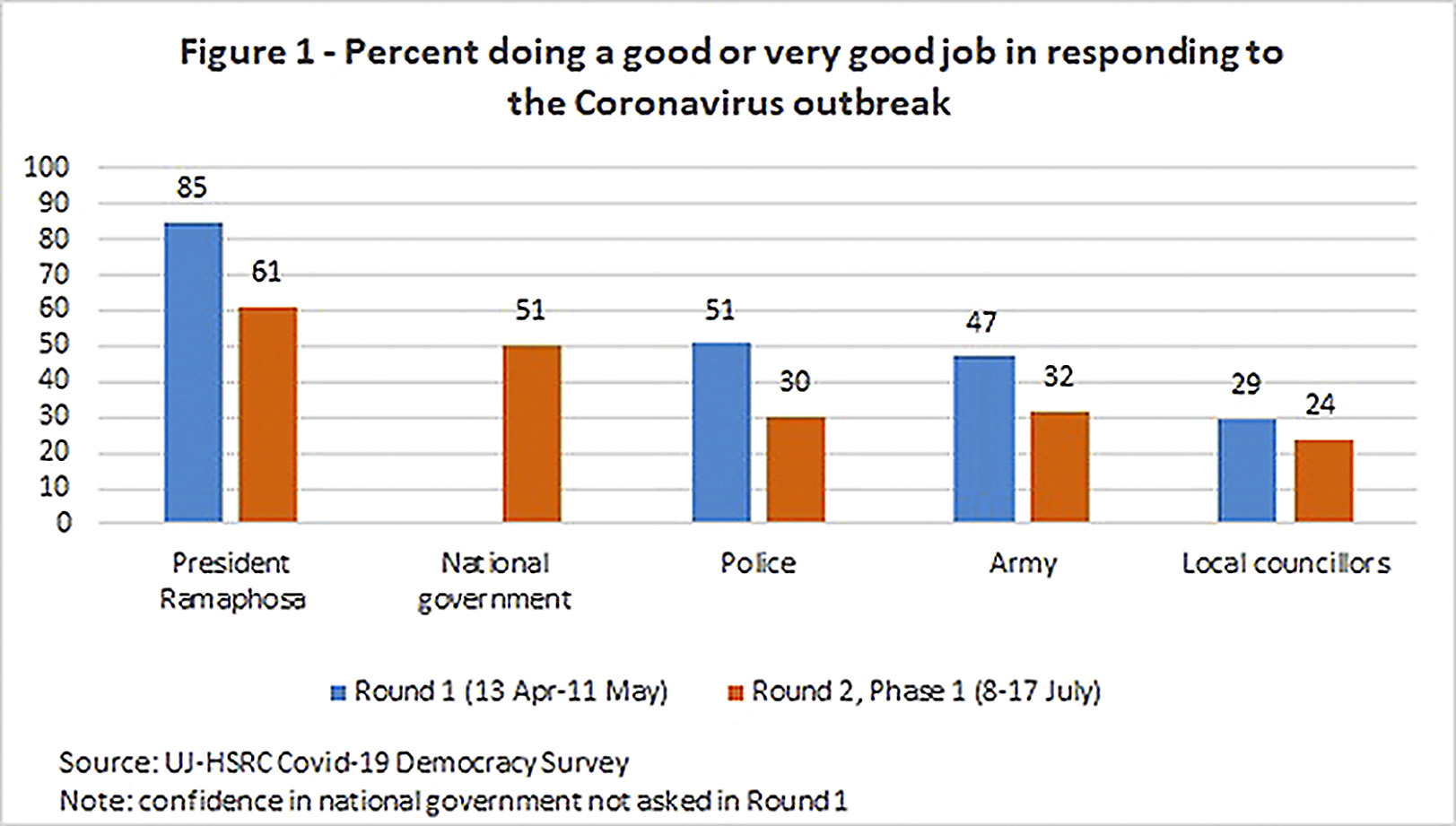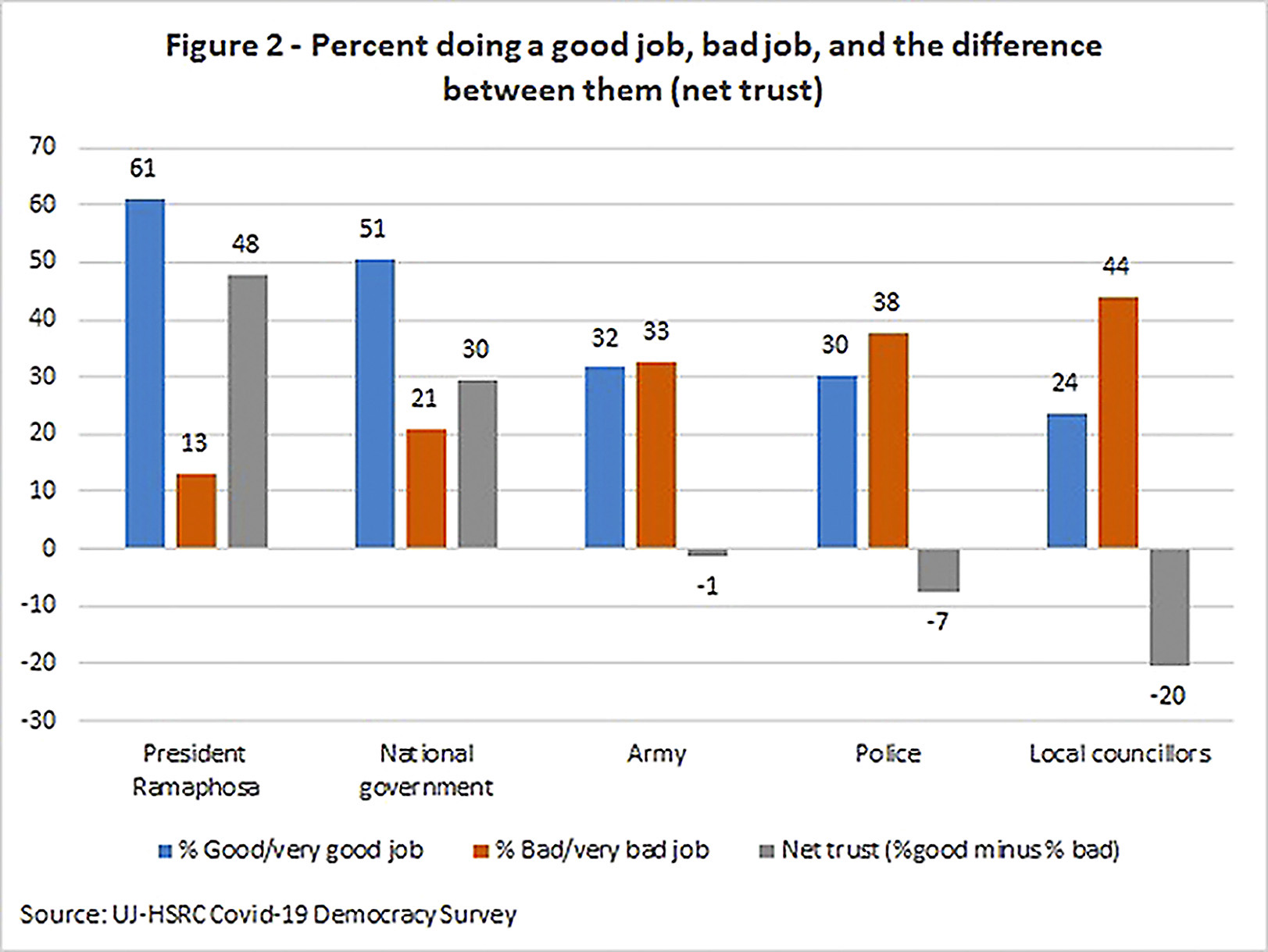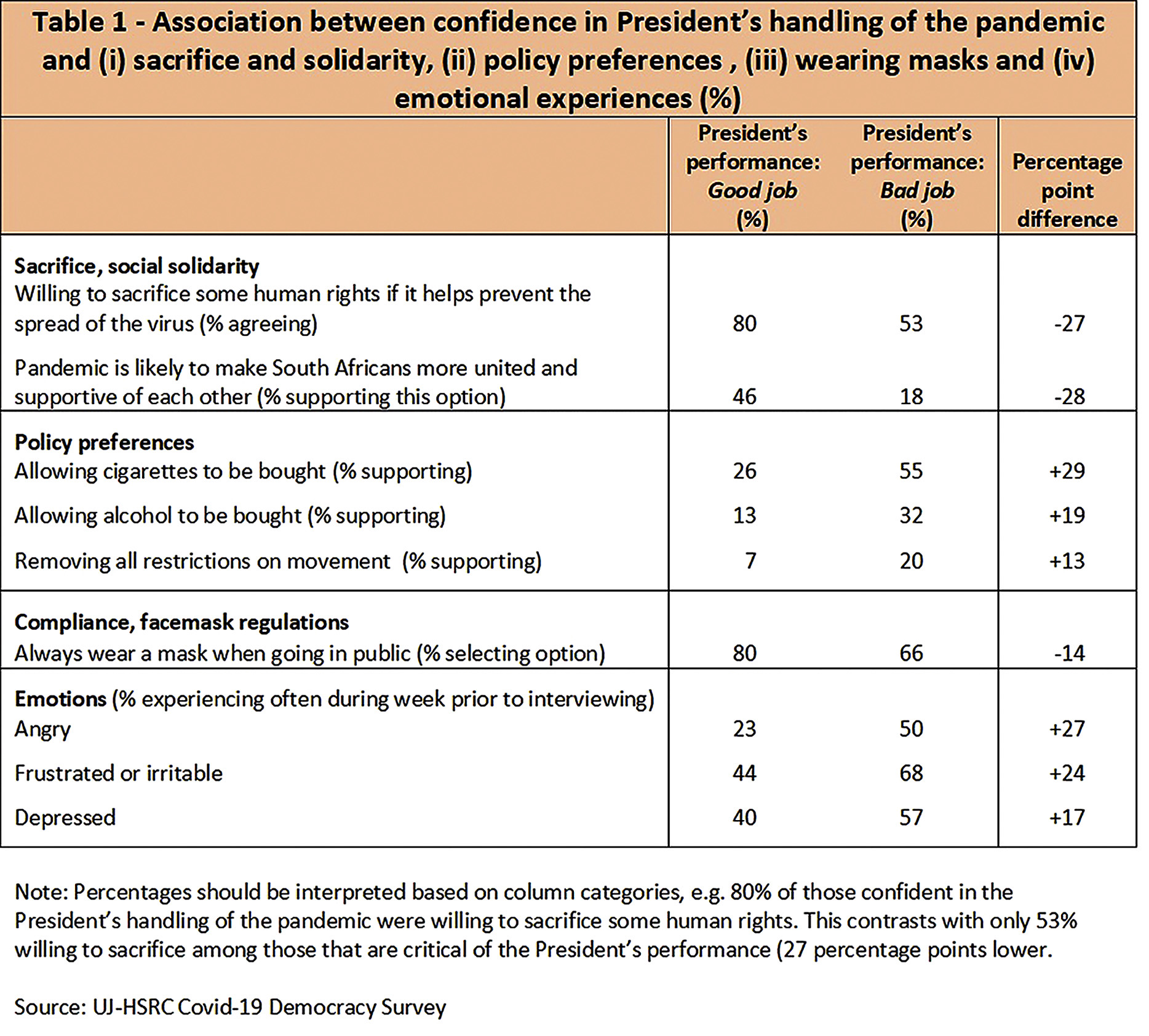Maverick Citizen Op-Ed
The Calculus of Trust: Diminished public confidence in the president’s performance

Confidence in President Cyril Ramaphosa’s handling of the pandemic has dropped substantially, after enthusiastic support during the hard lockdown period. Majority support remains, though telling divisions among the public have emerged. In this article, we profile this change and the association between confidence and Covid-19-relevant attitudes and behaviour.
A vote of confidence during the hard lockdown
At the end of April 2020 and after the first month of a full-blown national pandemic, President Cyril Ramaphosa’s strong messaging and decisive actions with the announcement of the national lockdown galvanised robust “trust in the President”. This was the baseline finding from the first round of the UJ-HSRC Democracy Lockdown Survey which collected online responses between 13 April and 11 May 2020.
Over successive phases of surveying during this period, the percentage believing that the President was doing a good or a very good job “in responding to the Coronavirus outbreak” averaged 85%.
A broad-based decline in confidence
Since then, as the country moved to lower lockdown levels, support for the President’s handling of the pandemic response has diminished 24 percentage points to 61%.
The data comprises 10,115 respondents for the first round of surveying, and 2,570 respondents for the first phase of our second round (3-17 July 2020). Results are broadly nationally representative, based on an opt-in sample using cellphones or computers, and weighted by race, education and gender to match Stats SA’s demographic data.
The decline in confidence has occurred across the socioeconomic divide, with statistically significant decreases for all subgroups examined. It ranges from a decline of 15 percentage points among residents in informal settlements (86% to 71%) and students (77% to 62%) to a 49 percentage point decline among white adults (90% to 41%) and Indian adults (82% to 33%). These class, race and geographical differences in presidential ratings are more pronounced than in the hard lockdown phase.
Party support strongly affects confidence in presidential performance. Among ANC supporters, 83% feel the President is doing a good job, compared to 46% among EFF supporters, 24% among DA supporters and 29% among those who support other parties.

Confidence in relative perspective
Confidence in the President remains higher than for other institutions that respondents were asked about. In our latest findings, only 50% rate the national government as doing a good job, 32% the army and just 30% the police. Councillors have slipped lower in South Africans’ estimation with an approval rating of only 24%.
 Political scientists look at net trust – positive minus negative responses. Net trust in the President is still firmly positive at 48% (Figure 2), as also for national government. For the army and police, this is no longer the case, and local councillors are more distrusted than trusted in their Covid-19 response.
Political scientists look at net trust – positive minus negative responses. Net trust in the President is still firmly positive at 48% (Figure 2), as also for national government. For the army and police, this is no longer the case, and local councillors are more distrusted than trusted in their Covid-19 response.
Why confidence matters
The decline becomes understandable with revealing associations between presidential confidence and respondents’ attitudes and behaviour.
Some of the biggest trust-based divisions relate to policy decisions that impact people’s daily lives. Support for lifting the tobacco ban stands at 26% among those who think the President is doing a “good job”, compared to 55% for those believing he is doing a “bad job”. Likewise, support for lifting the alcohol ban is 13% versus 32% respectively. While only 7% of those in the good job camp favour the removal of all restrictions on movement, this increases to 20% among the bad job camp.
 Confidence in presidential performance is associated with a greater willingness to sacrifice human rights (80% for those saying the President is doing a good job against 53% among those critical of his performance). It is also linked with a stronger belief that the pandemic is promoting social solidarity among South Africans (46% among those assenting, 18% among those dissenting).
Confidence in presidential performance is associated with a greater willingness to sacrifice human rights (80% for those saying the President is doing a good job against 53% among those critical of his performance). It is also linked with a stronger belief that the pandemic is promoting social solidarity among South Africans (46% among those assenting, 18% among those dissenting).
Behaviourally, trust in presidential performance matters for compliance with face mask regulations. In this case, 80% of the “trusting” report that they always wear a face mask when in public, compared to 66% of the “distrusting”.
Trust in the President (this is also true of trust in the government), is also strongly linked to the experience of certain negative emotions. Those who distrust the President are far more inclined to report that, over the past months, they have experienced anger (50% against 23% among those who trust the President), frustration (68% against 44%) and depression (57% against 40%).
From the above, it is evident that trust in the President permeates people’s political perceptions, attitudes, actions and emotional wellbeing.
Political analyst Steven Friedman has argued that the public needs to get over its “great leader fetish” and concentrate on personal responsibilities in the fight against the Covid-19 pandemic. Our findings indicate that confidence in political leadership matters in a number of ways. In terms of the declining trust in the President’s handling of the pandemic, South Africans are – over and above their persistent fear of loss of life and livelihood – experiencing a level of social frustration which is simply not captured by the headline trust percentages in the President, the government and the ANC.
At the time of writing, it remains unclear whether South Africa is turning a corner in the daily rate of Covid-19 infections and for how long the present policies will be maintained. With political trust considered an essential precondition for stable rule, if the downward trend outlined above persists, it may present a challenge to sound governance, both during the pandemic and after. DM/MC
Benjamin Roberts is a Chief Research Specialist and Coordinator of the South African Social Attitudes Survey (SASAS) in the Developmental, Capable and Ethical State (DCES) research division, HSRC. Martin Bekker is a researcher at the Centre for Social Change at the University of Johannesburg and an independent development consultant. Stephen Rule is a research director in the Developmental, Capable and Ethical State (DCES) research division at the HSRC. Mark Orkin is an Associate Research Fellow in the Centre for Social Change at the University of Johannesburg and a Visiting Professor in the Development Pathways to Health Research Unit, Wits University, and headed Stats SA in 1995-2000. Narnia Bohler-Muller is divisional executive in the Developmental, Capable and Ethical State (DCES) research division at the HSRC and adjunct Professor of Law, University of Fort Hare. Kate Alexander is Professor of Sociology, South African Research Chair in Social Change, and director of the Centre for Social Change at the University of Johannesburg.
Data is being collected in the online multilingual UJ/HSRC Covid-19 Democracy Lockdown Survey from all willing respondents in South Africa aged 18 or over. It is accessible using the #datafree Moya Messenger App on the #datafree biNu platform, or alternatively using data via https://hsrc.datafree.co/r/ujhsrc. Results are weighted by race, age and education, making them broadly representative of the population. The researchers will be downloading data and publishing further findings. This makes it possible to discern trends in people’s experiences and opinions about Covid-19 and the lockdown. Readers are invited to complete the questionnaire.
A summary of the survey’s Round 1 findings and a fuller explanation of methodology can be found at http://www.hsrc.ac.za/en/media-briefs/ceo/hsrc-uj-release-finding-multilingual-covid19-survey. Earlier articles based on the survey data have been published in Daily Maverick:
Unlocking the public’s preferences: What South Africans think of lockdown and policy responses
‘We are getting cold’: Lifting of clothing-sale ban comes not a moment too soon
Up in Smoke: Public reflections on decision to extend the ban on tobacco sales
Human rights remain essential during the Covid-19 crisis
Reopening of schools: Bold leadership and planning required
Calls for bolder action as lockdown exposes fault lines of inequality
‘Hungry — we are starving at home’
President Cyril Ramaphosa’s job performance
The hidden struggle: The mental health effects of the Covid-19 lockdown in South Africa
Class and the Covid-19 crisis: questions of convergence and divergence
Survey shows government’s schools policy is opposed by a large majority
Smoke and mirrors: Public perceptions on banning the sale of cigarettes
"Information pertaining to Covid-19, vaccines, how to control the spread of the virus and potential treatments is ever-changing. Under the South African Disaster Management Act Regulation 11(5)(c) it is prohibited to publish information through any medium with the intention to deceive people on government measures to address COVID-19. We are therefore disabling the comment section on this article in order to protect both the commenting member and ourselves from potential liability. Should you have additional information that you think we should know, please email [email protected]"






 Become an Insider
Become an Insider